Podcast: Download (Duration: 37:42 — 34.6MB)
Get Notified Of Future Episodes Apple Podcasts | Spotify | Amazon Music | Android | Blubrry | Gaana | TuneIn | Deezer | Anghami | RSS | More
Episode highlights:
01:14 – An age-old concept you can still profit from. A lot of marketing revolves around this topic.
03:29 – What a launch actually is. It may not be what you think it is.
06:45 – What makes up the launch campaign. It’s as simple as a few pages.
08:24 – The kind of value you offer in three videos. This is why you need them, and what they contain.
12:32 – From sale page to close page. It basically runs like this…
15:34 – How to build a launch using 10XPRO. A few clicks is all it takes.
19:31 – Other things you can do on the platform. Yes, there’s more.
22:13 – Motivation and engagement. Get your audience involved and connected.
24:31 – Delivering value before the sale. You want them to know you, like you, trust you.
28:04 – Traffic, partners and affiliates. Now you partner with people.
30:25 – Taking things a bit further. Go bigger? Yes you can.
James and many-time guest John Lint have talked often and unapologetically about 10XPRO. And on this blog there are plenty of customer success stories to vouch for its merits.
If you’re not using 10XPRO, however, today’s topic can be applied to whatever platform you have. Because the concept James and John will discuss is as old as marketing, and has been used successfully for ages in the industry.
An age-old principle you can still profit from
We’re talking about the launch concept. And it’s super relevant, says James, if you’re just starting and about to put your first product on the market.
“Don’t compare a thriving business now to your business when you’re starting out.”
James himself is not a big launch guy, having a more ongoing business model and an established database. But he coaches people who thrive on launches. It’s a case of, don’t compare my business now to your business when you’re starting out.
Lots of John’s clients do launches, and he’s going to lay down the basics and walk you through a setup of a launch campaign.
What a launch actually is
And what is a launch? It’s not about launching a product, says John, but about doing a series of steps. It’s actually a funnel, used a lot across different markets, to maximize sales. It’s meant to invite people to take the next step, to decide if they want to get results, with your help.
To assist this decision, John says, you need to provide a ton of value. And to do this online, you typically teach something cool. This can be done via text, or as widely done today, via video.
So a launch can be a series of videos, usually three, released at intervals of two or three days. Say you’re in the golfing market – each video may provide a new tip to improve your game. And after watching those videos, your prospect, hopefully, will know, like and trust you enough to consider buying your golf mastery course.
“It’s about providing a ton of value before you ask for the sale.”
So a launch is not just about launching your new thing. It’s about providing a ton of value before you ask for the sale.
What makes up the launch campaign
As you can see in John’s blueprint, a launch campaign is composed of several pages. First is the opt-in page. And people will opt-in to access the three videos you’re offering on a specific topic. It’s almost like a mini course, which is why online folks often call this a workshop strategy.
What John is showing now is what he calls a live launch, as compared to an automated launch. The live launch happens on specific dates, while the automated launch runs on autopilot. Either can be set up easily in 10XPRO.
On the opt-in page, you offer access to your free video series. When someone opts in, their details go to your emailing system, and you build your list. Then the prospect lands on the video one page.
The kind of value you offer in three videos
Video one is basically just a page with a video that contains a number of things:
Remember to hint with this and with succeeding videos that what you’re giving is part of your course, or training program, or services that could help the viewer even more should they decide to purchase.
Naturally, once the prospect is in your email database, you can tell them about the next videos you’re going to release.
Two or three days later, you release video two, another page with a video, that could teach them, say, X mistakes to avoid on the way to that awesome result.
In all the videos, you include info about yourself, your results, other people’s results, a proof or testimonial. And you tell them the tips you provide are part of a bigger solution or product that you offer.
After two or three days you deliver video three, another tip, but with what John calls the user experience. What would it be like to take part in your course? What things could someone learn to get more results? And this is where you might give a blueprint, a sort of overview of, for instance, being the ultimate golfer.
This, hopefully, motivates people to want more. And should they want more, the funnel takes them through the same sort of steps discussed in James and John’s previous episode, about the live sale campaign.
From sale page to close page
The sale campaign is a sale page, an order page, and a thank you page. The sale page recaps the offer, talks about the course or the service, tells people why they should get it, what they are going to get and how they can get it. It talks about bonuses and guarantees.
The sale page goes to an order page, where they fill in payment details. And after they submit payment, they land on the thank you page.
“The fact that your launch has a limited time offer is extremely powerful.”
Then, when you’re closing the campaign, you have the close page that people will land on when they try to access any of the above pages. It will tell them the launch is closed, and they can contact your support team for questions. The fact that your campaign has a limited time offer is very powerful.
How to build a launch in 10XPRO
There you have the strategy. Now the matter of setting it up, depending on your platform, can be simple or complicated. John demonstrates how one would build a launch in 10XPRO.
You go to campaigns, click the plus button, and name your campaign, say, James demo launch campaign. Then you click live launch.
The page refreshes, and all the pages John spoke of are generated – optin page, videos one two and three, sale page, order page, thank you page, and close page.
These are all customizable and come with page templates you can choose from.
Take the opt-in page – you make your promise, and invite people to enter their details for access to your free workshop or mini-course.
When you’re launching to an existing list you might skip the opt-in page, but the rest of the process is the same. And each time you release a video, you email your list to inform them.
 The launch strategy is powerful, says John, because when you’re starting out, people don’t really necessarily know you, right? So you need to prove to them that you know what you’re talking about. Not by flashing your credentials, but by providing free, valuable content, proving you can help them by actually helping them first.
The launch strategy is powerful, says John, because when you’re starting out, people don’t really necessarily know you, right? So you need to prove to them that you know what you’re talking about. Not by flashing your credentials, but by providing free, valuable content, proving you can help them by actually helping them first.
After providing value, you can invite them to take the next step, find out more about what you’re offering, via the sale page. If they want it, great. If they don’t, that’s okay, too. They’re on your list and you’ll have other opportunities.
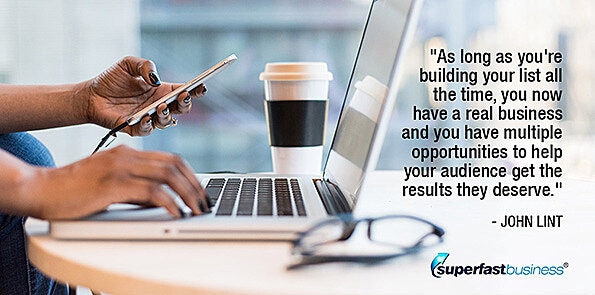 As long as you’re building your list all the time, you now have a real business and you have multiple opportunities to help your audience get the results that they deserve, whether through your own products, or through someone else’s product.
As long as you’re building your list all the time, you now have a real business and you have multiple opportunities to help your audience get the results that they deserve, whether through your own products, or through someone else’s product.
Other things you can do on the platform
James likes it. Now with some launches he’s seen, there are grayed out areas to indicate future trainings. Can that be done in 10XPRO?
It can, says John. You may want to show people trainings that you have, but that they don’t have access to. Or you can hide them till people do have access.
Your launch video pages can be public-facing, with a navigation, as in a template John has.
And you can prompt interaction with comments, which John says work with whatever system you want, Facebook or Disqus, for instance.
Offering a download is also a great thing to do. Anything to add value.
Delivering value before the sale
It’s all about getting people to know you, like you and trust you. Not by telling them how great you are, but showing how you help people, by positioning yourself as an expert who is helping them and who has helped others.
You want to make sure at the end that they feel ready to buy your solution.
It’s similar to James’s 30-Day Challenge, which runs on 10XPRO. It’s prepping people in advance of a sale by giving them value and helping them first. Every day for 30 days they get a tip and exercise from his book. It’s free, and it’s educational, and James gets interaction from people replying to his emails, giving feedback and sharing their progress. It’s fascinating, he says, watching them go through.
One of the things James loves about 10XPRO is a dashboard that shows people’s progress through the training. It shows where people get stuck and what could be improved, all the analytics and stats you could use to tune the digital marketing funnel.
Traffic, partners and affiliates
The next evolution of a launch, says John, would be to drive traffic to your opt-in page, maybe through ads.
And when your launch campaign is going well, you can partner with other people, maybe motivate them to email their own audience about your course and send them to the opt-in page.
If you’re delivering massive value, building your list and maximizing sales, you can take on affiliates. You might start on-on-one, then engage more.
Taking things a bit further
When things are going good, John suggests using your campaign as part of what he calls cascading profits, which is a series of campaigns. He talked about one of them in the previous podcast, which was the automated, limited sale campaign.
You can do an automated launch. Say someone joined your email list and went through a quick sale campaign of yours, but didn’t buy. You have an opportunity then to put them into an automated launch, automatically. Your emailing system will put them into another campaign. But the doors of its pages would be open and closed based on their own registration to the launch campaign. This lets them grow and get all of this content, get to know and like you, see you’re the real deal. And again, they have the limited sale campaign that works on autopilot, making them another offer, all on autopilot.
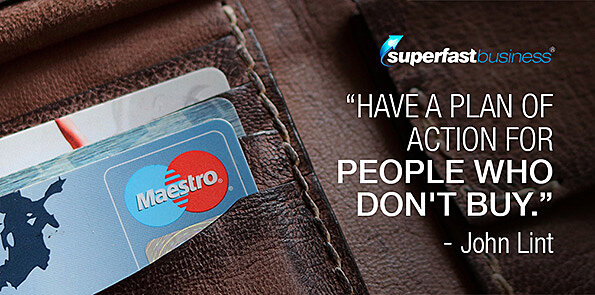 You need to have a plan of action for people who don’t buy. If they don’t buy in campaign one, you can cascade them into campaign two. If they don’t buy there, they can go to campaign three, etc.
You need to have a plan of action for people who don’t buy. If they don’t buy in campaign one, you can cascade them into campaign two. If they don’t buy there, they can go to campaign three, etc.
And if you change the types of campaigns, you’re not asking them to buy the same product. You’re providing values with different angles and different modules, different ways, and it never feels like you’re pitching them anything.
If you need more reasons to love 10XPRO…
Now say you wanted affiliates. What program would you have to integrate with 10XPRO, James asks?
It’s built in, says John.
Mind-blowing, says James. If you wanted to be an affiliate for 10XPRO and get commissions forever, would that be an option?
Absolutely, John replies.
James has been talking about 10XPRO for some time. He partners with it because he loves the platform, and is in the process of moving some of his prime assets into 10XPRO. It currently houses for James a book funnel, a challenge funnel, information products, a dashboard and a cart. And it all works via an app.
Look for James and John to cover more campaigns on the show. And if you’re interested in a one-stop campaign solution, look up John and his team at KLEQ.
Liked the show? Enjoy all the episodes when you subscribe on iTunes
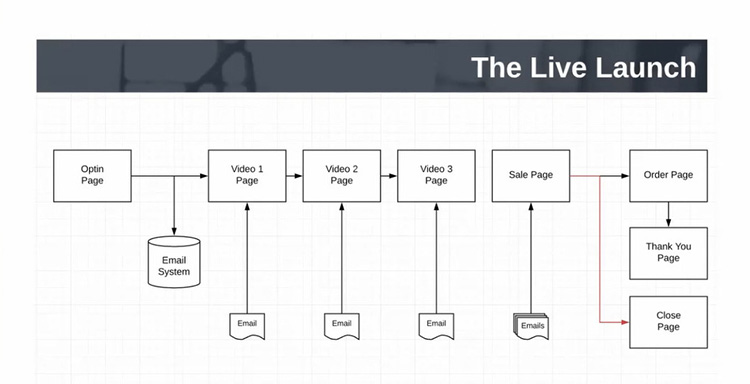
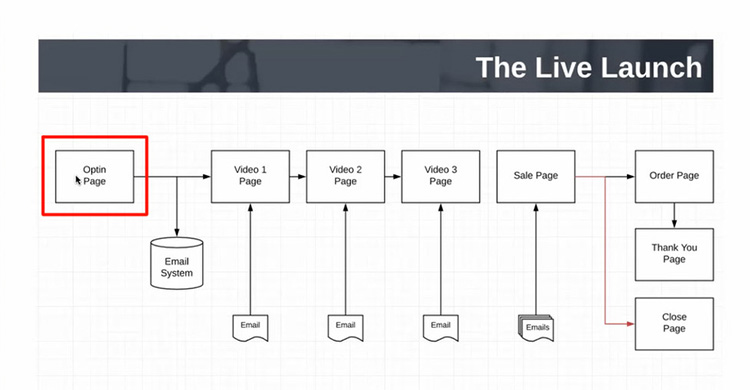
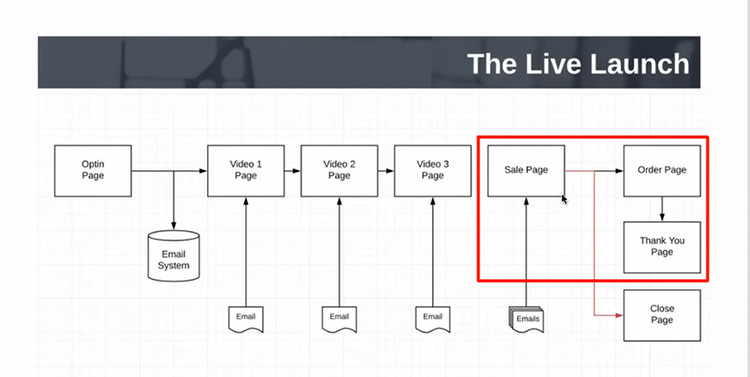
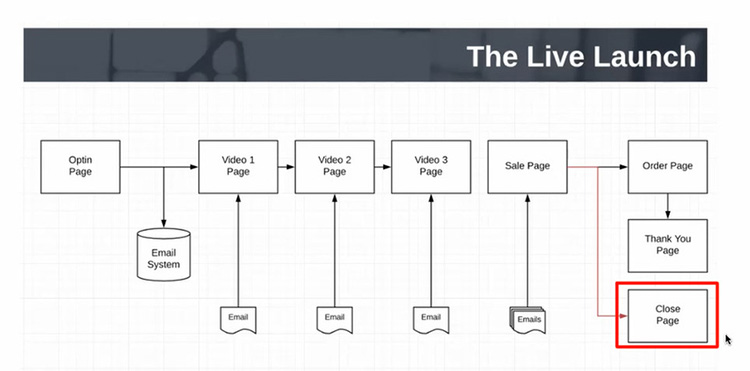
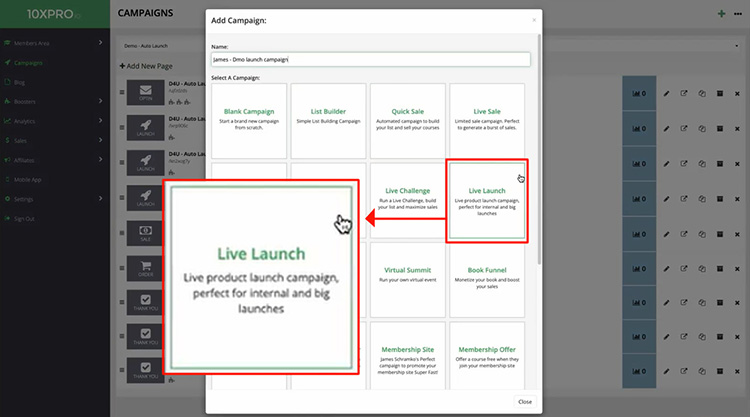
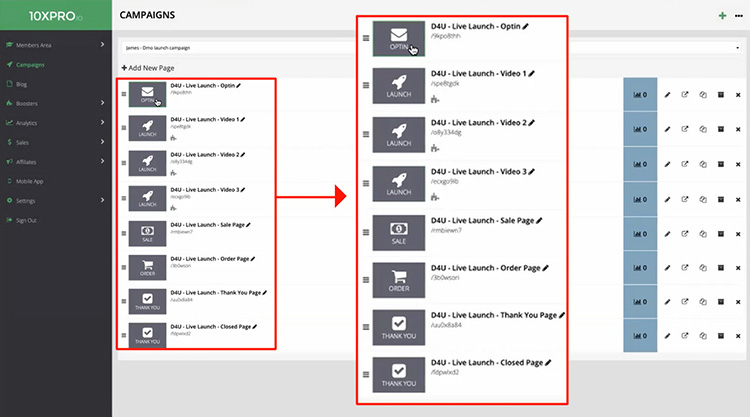
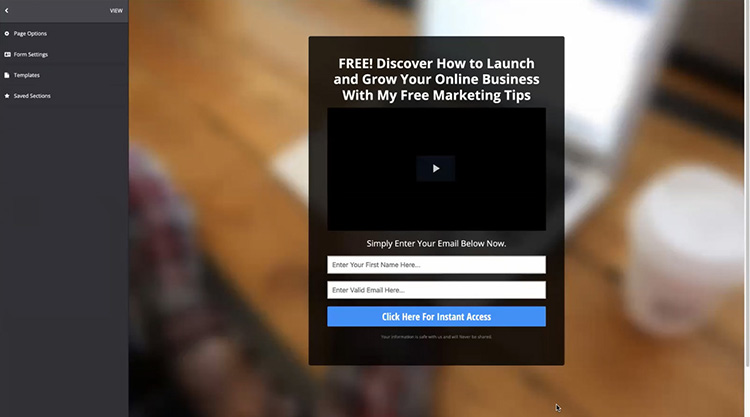
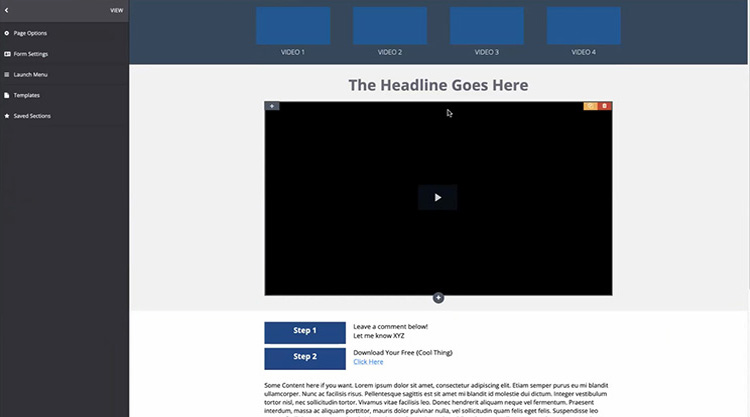

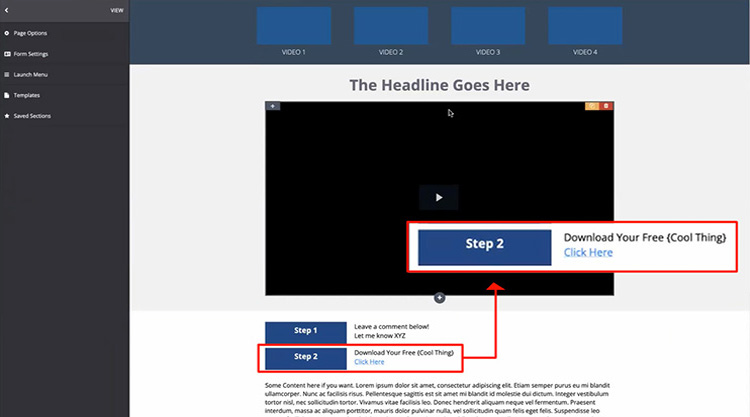









Leave a Reply